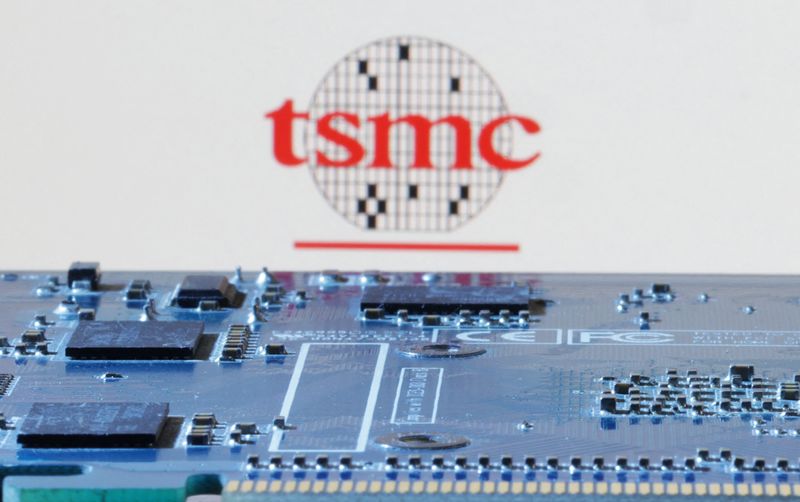TSMC to win more than $5 billion in grants for a US chip plant, Bloomberg reports

FILE PHOTO: Taiwan Semiconductor Manufacturing Company (TSMC) logo is seen near computer motherboard in this illustration taken January 8, 2024. REUTERS/Dado Ruvic/Illustration/File Photo
TSM
-1.86%
Add to/Remove from Watchlist
Add to Watchlist
Add Position
Position added successfully to:
Please name your holdings portfolio
Type:
BUY
SELL
Date:
Amount:
Price
Point Value:
Leverage:
1:1
1:10
1:25
1:50
1:100
1:200
1:400
1:500
1:1000
Commission:
Create New Watchlist
Create
Create a new holdings portfolio
Add
Create
+ Add another position
Close
(Reuters) – Taiwan Semiconductor Manufacturing Co (TSMC), the world’s largest contract chipmaker, is set to win more than $5 billion in federal grants from the U.S. government for setting up a chipmaking plant in Arizona, Bloomberg News reported on Friday.
The award is yet to be finalized and it is unclear whether TSMC will tap the loans and guarantees also on offer from the 2022 Chips and Science Act, the report said, citing people familiar with the matter.
TSMC and the U.S. Commerce Department did not immediately respond to Reuters requests for comment.
TSMC, which makes chips used in Apple (NASDAQ:AAPL)’s iPhones, has said it would invest about $40 billion in its Arizona plant, among the largest foreign investments in U.S. history.
The U.S. has been vying to increase domestic semiconductor production through the U.S. CHIPS Act, which was passed in 2022 and provides $52.7 billion in funding, including $39 billion in subsidies for semiconductor production and $11 billion for R&D.
The Biden administration said last month it was awarding $1.5 billion to contract chip manufacturer GlobalFoundries (NASDAQ:GFS) under the Act.
U.S. Commerce Secretary Gina Raimondo had said in February, the department plans to make several funding awards within two months.
TSMC’s advanced manufacturing processes are used in the production of Nvidia (NASDAQ:NVDA)’s industry leading artificial intelligence chips.
The Taiwanese chipmaker had said in January that demand for advanced packaging was very strong and it couldn’t offer enough capacity to support customers, which will continue to next year. Lagging capacity for advanced packaging has been a central bottleneck for the scaling up supply of complex AI chips.








